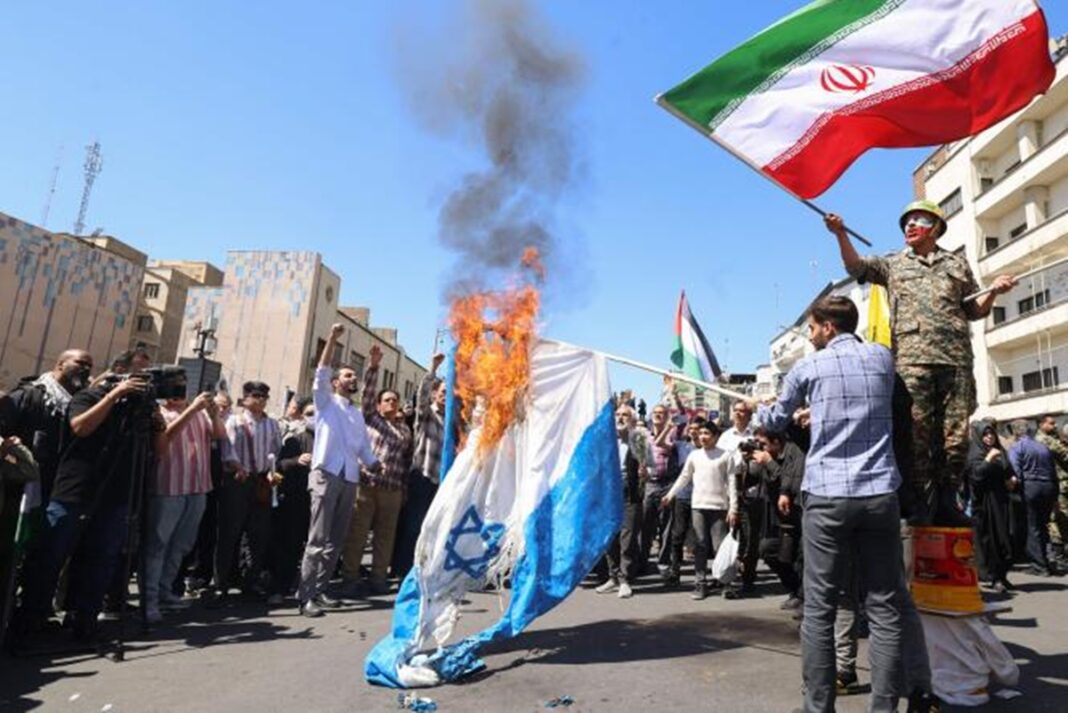X: @the_news_21
In the volatile landscape of the Middle East, the longstanding enmity between Iran and Israel has once again erupted into violence, with recent military exchanges raising concerns not only regionally but globally. The clash, fueled by historical animosities and contemporary geopolitical ambitions, threatens to reshape alliances, disrupt trade routes, and destabilize economies.
The latest chapter in this tumultuous saga unfolded when an Israeli attack on the Iranian embassy in Damascus claimed the lives of seven military officers, prompting a swift retaliatory strike from Iran. Hundreds of drones, ballistic missiles, and cruise missiles were launched towards Israel, igniting fears of a wider conflict. While Israel claims to have intercepted the majority of the incoming threats, the exchange underscores the precariousness of the situation.
Iran-Israel Relations: From Allies to Adversaries
The roots of the Iran-Israel conflict trace back to decades of shifting alliances and geopolitical maneuvering. Once considered allies during the Pahlavi dynasty, Iran was among the first Muslim-majority nations to recognize Israel. However, the tide turned following the Islamic Revolution of 1979, which saw Iran severing ties with Israel and adopting a staunchly anti-Zionist stance.
Impact on India: Balancing Act Amidst Growing Hostilities
For India, the escalation between Iran and Israel presents a delicate diplomatic challenge. With significant Indian expatriate populations in both countries and strategic interests at stake, New Delhi finds itself navigating treacherous waters. The Chabahar port development, a key initiative linking India to Central Asia and beyond, faces uncertainty amidst the specter of war, while trade routes vital to Indian interests risk disruption.
Global Ramifications: Economic Fallout and Energy Concerns
Beyond the immediate region, the conflict threatens to reverberate across the global economy. As tensions escalate, oil prices surge, raising fears of inflation and economic instability. With the world economy already grappling with the aftermath of the pandemic, the prospect of a protracted conflict between Iran and Israel adds further uncertainty to an already fragile situation.
Calls for Restraint and Diplomacy
As the world watches anxiously, calls for de-escalation and diplomacy grow louder. Amidst the saber-rattling and military posturing, the imperative of dialogue and negotiation cannot be overstated. The consequences of failure are too grave to contemplate, underscoring the urgent need for all parties to exercise restraint and pursue peaceful resolutions to their grievances.
Conclusion: Navigating Uncertain Waters
In the complex web of geopolitics, the Iran-Israel conflict stands as a stark reminder of the fragility of peace and the dangers of unchecked aggression. As India and the world brace for the fallout, the imperative of diplomacy and cooperation looms large. In an era marked by uncertainty and upheaval, the path to stability lies not in confrontation, but in dialogue and mutual understanding. Only through concerted efforts can the specter of war be averted, and the promise of peace be realized.
Also Read: Iran Warns of Targeting US Bases amid Escalating Tensions with Israel








After research a couple of of the blog posts on your web site now, and I actually like your means of blogging. I bookmarked it to my bookmark website checklist and shall be checking back soon. Pls take a look at my web page as properly and let me know what you think.
Thank you for your sharing. I am worried that I lack creative ideas. It is your article that makes me full of hope. Thank you. But, I have a question, can you help me?
certainly like your web site however you have to check the spelling on quite a few of your posts. A number of them are rife with spelling issues and I find it very bothersome to inform the reality on the other hand I’ll surely come again again.
I’ve been absent for a while, but now I remember why I used to love this web site. Thank you, I will try and check back more often. How frequently you update your website?
Thanks for any other informative site. The place else may I get that type of info written in such a perfect means? I have a challenge that I’m simply now operating on, and I have been on the glance out for such information.
how can i get generic clomiphene price how can i get clomiphene without prescription can i purchase cheap clomid online how can i get clomiphene without prescription clomid price at clicks clomid pct buy cheap clomiphene tablets
More posts like this would bring about the blogosphere more useful.
The thoroughness in this draft is noteworthy.
buy generic azithromycin 250mg – order floxin 200mg for sale buy generic metronidazole
order generic motilium – order domperidone sale cyclobenzaprine pill
nexium sale – https://anexamate.com/ esomeprazole order online
Hello there, just became alert to your blog through Google, and found that it’s truly informative. I’m going to watch out for brussels. I’ll appreciate if you continue this in future. Many people will be benefited from your writing. Cheers!
medex price – https://coumamide.com/ order cozaar without prescription
I like this internet site because so much utile stuff on here : D.
deltasone 10mg price – https://apreplson.com/ deltasone 20mg brand
buy pills for erectile dysfunction – https://fastedtotake.com/ ed pills
amoxil order – amoxil sale cheap amoxicillin sale
purchase diflucan generic – https://gpdifluca.com/# buy diflucan 200mg pill
cheap cenforce 100mg – on this site cenforce where to buy
buy cheapest cialis – https://ciltadgn.com/# cialis professional 20 lowest price
cialis erection – cialis generic overnite shipping cialis 100mg review
ranitidine 150mg tablet – click buy ranitidine cheap
how to order viagra cheap – https://strongvpls.com/# viagra sale over counter uk
More posts like this would force the blogosphere more useful. fildena que es
This is the kind of writing I rightly appreciate. order zithromax online cheap
More peace pieces like this would make the интернет better. https://ursxdol.com/synthroid-available-online/
Thanks on sharing. It’s top quality. https://prohnrg.com/product/omeprazole-20-mg/
Thanks on putting this up. It’s evidently done. https://aranitidine.com/fr/sibelium/
More peace pieces like this would create the интернет better. https://ondactone.com/product/domperidone/
Hello my friend! I want to say that this article is amazing, nice written and include almost all significant infos. I would like to see more posts like this.
Some really prize blog posts on this site, saved to favorites.
Thanks for putting this up. It’s understandably done.
buy generic dutasteride over the counter
Thanks an eye to sharing. It’s first quality. http://www.underworldralinwood.ca/forums/member.php?action=profile&uid=488144
Woh I enjoy your posts, saved to bookmarks! .
I’m still learning from you, as I’m trying to reach my goals. I absolutely enjoy reading everything that is posted on your site.Keep the tips coming. I enjoyed it!
obviously like your web-site however you have to take a look at the spelling on quite a few of your posts. Several of them are rife with spelling problems and I to find it very troublesome to inform the reality then again I’ll definitely come again again.
dapagliflozin 10 mg without prescription – buy dapagliflozin 10mg sale order forxiga 10 mg sale
xenical over the counter – buy generic xenical for sale buy orlistat 60mg online cheap
The thoroughness in this piece is noteworthy. http://www.kiripo.com/forum/member.php?action=profile&uid=1193174
You can keep yourself and your dearest by being cautious when buying medicine online. Some druggist’s websites control legally and sell convenience, reclusion, cost savings and safeguards to purchasing medicines. buy in TerbinaPharmacy https://terbinafines.com/product/zoloft.html zoloft
More posts like this would persuade the online time more useful. click
More posts like this would create the online elbow-room more useful.
That is very fascinating, You’re a very skilled blogger. I have joined your feed and sit up for searching for more of your wonderful post. Additionally, I’ve shared your site in my social networks!
kuwin sở hữu kho game đa dạng từ slot đến trò chơi bài đổi thưởng, mang đến cho bạn những giây phút giải trí tuyệt vời.
Tham gia cộng đồng game thủ tại Go88 để trải nghiệm các trò chơi bài, poker phổ biến nhất hiện nay.
Thank you for sharing superb informations. Your website is very cool. I’m impressed by the details that you have on this blog. It reveals how nicely you perceive this subject. Bookmarked this website page, will come back for more articles. You, my pal, ROCK! I found just the information I already searched everywhere and simply couldn’t come across. What an ideal website.
As a Newbie, I am always browsing online for articles that can benefit me. Thank you
I got what you intend, regards for posting.Woh I am pleased to find this website through google.
I’m impressed, I need to say. Actually not often do I encounter a weblog that’s both educative and entertaining, and let me inform you, you’ve gotten hit the nail on the head. Your idea is outstanding; the issue is one thing that not enough persons are speaking intelligently about. I am very pleased that I stumbled across this in my seek for something relating to this.
Absolutely composed subject material, appreciate it for information .
Tham gia cộng đồng game thủ tại Go88 để trải nghiệm các trò chơi bài, poker phổ biến nhất hiện nay.
Theo iGaming Asia (2024), w888slot.net thuộc Top 5 nhà cái phát triển nhanh nhất khu vực, với mức tăng trưởng người dùng lên tới 62%/năm.
Theo iGaming Asia (2024), w888slot.net thuộc Top 5 nhà cái phát triển nhanh nhất khu vực, với mức tăng trưởng người dùng lên tới 62%/năm.
Theo iGaming Asia (2024), w888slot.net thuộc Top 5 nhà cái phát triển nhanh nhất khu vực, với mức tăng trưởng người dùng lên tới 62%/năm.
Với giao diện mượt mà và ưu đãi hấp dẫn, MM88 là lựa chọn lý tưởng cho các tín đồ giải trí trực tuyến.
I’d perpetually want to be update on new content on this internet site, bookmarked! .
Thank you, I’ve recently been searching for information about this topic for ages and yours is the greatest I have discovered so far. But, what about the bottom line? Are you sure about the source?
Hi my friend! I wish to say that this article is awesome, nice written and include approximately all important infos. I?¦d like to see more posts like this .
I really enjoyed your unique perspective hereyou raised points I hadnt considered before, which made this super thought-provoking.
Hi there! I just wanted to ask if you ever have any problems with hackers? My last blog (wordpress) was hacked and I ended up losing many months of hard work due to no back up. Do you have any methods to stop hackers?
betmgm ID https://betmgm-play.com/ betmgm South Carolina